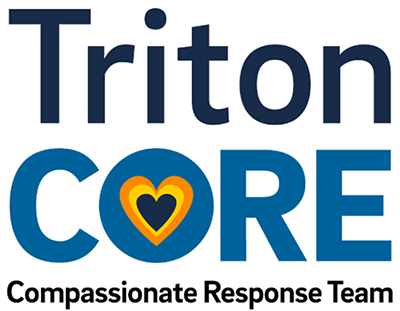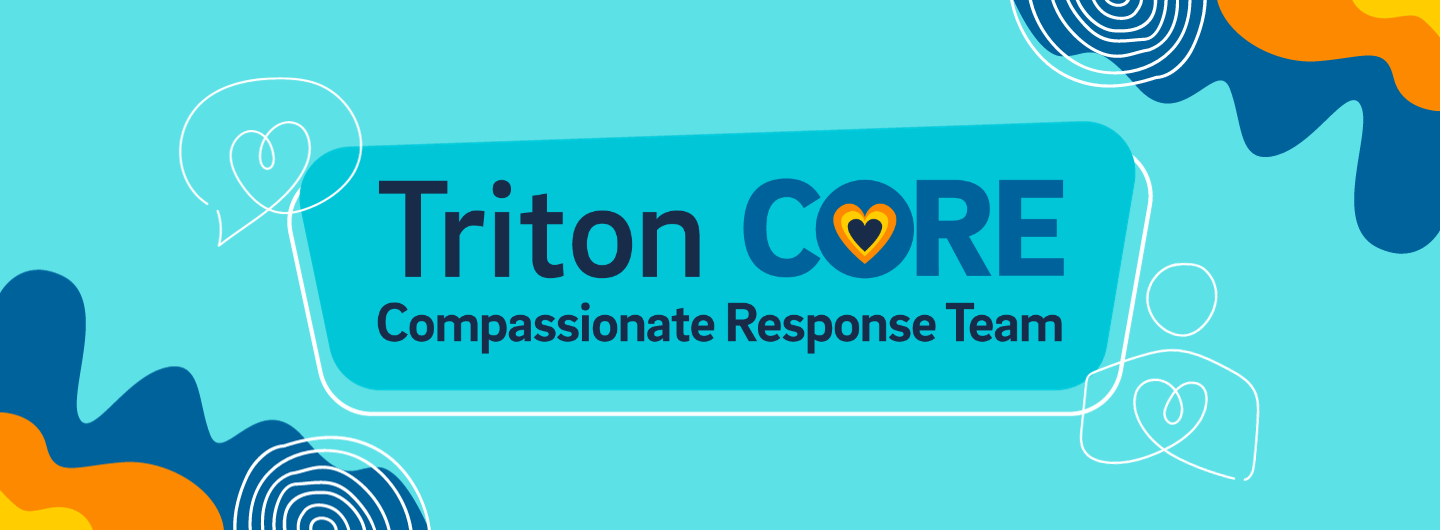
About Triton CORE
Triton CORE is a mobile response team at UC San Diego that provides compassionate intervention and support to students experiencing a behavioral health crisis. The Triton CORE team is composed of licensed behavioral health professionals equipped to engage in mobile crisis response, conduct behavioral health wellness checks, and can provide in-person or telehealth assessment for students facing behavioral health challenges, substance use related crises, and other forms of distress. See more related to What Triton CORE Does.
You can also learn more about Triton CORE Values focused on providing person-centered care.WHO TRITON CORE SERVES
At this time, Triton CORE only serves current students that are physically on campus.
Please see resources for non-students and students who are off-campus.
WHO CAN ACCESS TRITON CORE
Anyone can call and request a Triton CORE response for students that are on campus. Below are helpful tips for accessing support for:
HOW TO ACCESS TRITON CORE
Call (858) 534-HELP (4357)
- Be sure to request the Triton CORE team and be ready to answer a few basic safety questions.
Counseling & Psychological Services
Call (858) 534-3755
- Available 24/7 by phone
- Connect with counseling staff or after-hours crisis counselor
- Operated by UC San Diego
988 National Crisis Hotline
Call or text 988
- Available 24/7
- Connect with a counselor
- If appropriate, in-person resources may be dispatched
- Not operated by UC San Diego
Protocall Crisis Counseling Line
Coming Soon
Students may also self-present to Urgent Care at CAPS in Galbraith Hall between 8am—4pm Monday—Friday to access emergency mental health services.
The Triton CORE team's current hours of operation are Monday–Friday between 10am–10pm.
Outside of these hours, operating procedure remains with UCPD responding to all calls coming through dispatch.
During school breaks, please visit Quarter‑Break Resources for Student Health and Well‑Being’s updated hours of operation and information about available care options.
TYPES OF CALLS TRITON CORE CAN RESPOND TO:
Triton CORE will respond to
Non-violent calls for individuals experiencing behavioral health crisis such as:
- Thoughts of wanting to disappear
- Wishing to go to sleep and not wake up
- Thoughts of wanting to harm myself or end my life
- Thoughts of wanting to harm others
- Experiences as though you are seeing or hearing things that other people may not be able to see or hear
- Difficulty accessing food, clothing shelter due to an increase in your mental health symptoms
-
Alcohol or Substance use
- Any other symptoms requiring a behavioral health response
- In-person or virtual wellness check-ins
Triton CORE cannot respond to:
Calls where imminent safety concerns exist such as:
- Active Suicide Attempt
- Active Shooter/Violence
- Actively using a lethal weapon
- Active self-injury with a weapon
- Relationship Violence (Intimate Partner Violence)
- Active Fire/ Hazardous Material
- Medical Emergencies
All of these calls will continue to be responded to by UCPD.
SUPPORT A STUDENT IN CRISIS
Review our 5 steps to support a student in crisis (Framework from NHI Suicide Prevention Website).
LAND ACKNOWLEDGEMENT
The UC San Diego community holds great respect for the land and the original people of the area where our campus is located. The university is built on the un-ceded territory of the Kumeyaay Nation. Today, the Kumeyaay people continue to maintain their political sovereignty and cultural traditions as vital members of the San Diego community. We acknowledge their tremendous contributions to our region and thank them for their stewardship.
LABOR ACKNOWLEDGEMENT
"We must acknowledge that much of what we know of this country today, including its culture, economic growth, and development throughout history and across time, has been made possible by the labor of enslaved Africans and their ascendants who suffered the horror of the transatlantic trafficking of their people, chattel slavery, and Jim Crow. We are indebted to their labor and their sacrifice, and we must acknowledge the tremors of that violence throughout the generations and the resulting impact that can still be felt and witnessed today." — Terah ‘TJ’ Stewart
In accordance with applicable Federal and State law and University policy, the University of California does not discriminate, or grant preferences, on the basis of race, color, national origin, religion, sex, disability, and/or other protected categories.
Review Proposition 209.
Learn more about the University of California Anti-Discrimination Policy.
